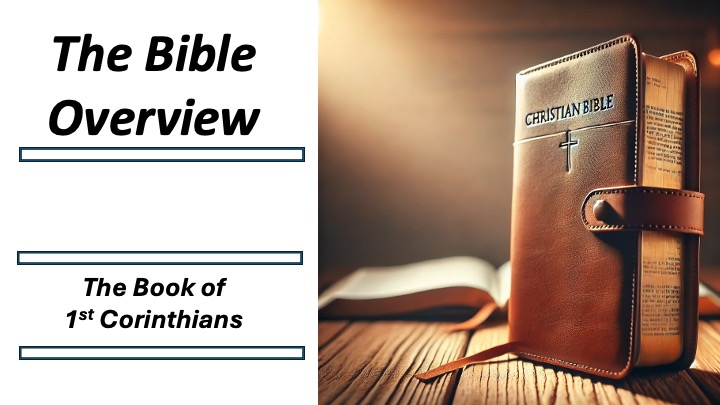Bible Overview 1 Corinthians
Mike Ervin

1st CORINTHIANS STUDY OVERVIEW
1. AUTHORSHIP AND DATE
Traditional View:
• 1 Corinthians is traditionally attributed to Paul the Apostle, writing from
Ephesus (1 Cor. 16:8).
• Written around AD 53–55, during Paul’s third missionary journey.
Modern Scholarly View:
• Most scholars agree Paul wrote 1 Corinthians, as its authenticity is widely
undisputed.
• Some suggest later editorial influences, but the core message remains
Pauline.
• Reflects issues in a diverse, urban, Greco-Roman church context.
2. INTENDED AUDIENCE
• Written to the church in Corinth, a cosmopolitan, commercial city in Greece.
• The church was struggling with division, immorality, and theological
confusion.
• Paul provides pastoral guidance to unify and correct their behavior.
3. MAJOR THEMES
1. Church Unity – Addressing factions and divisions (1 Cor. 1–3).
2. Christian Morality – Warnings against sexual immorality (ch. 5–7).
3. Spiritual Gifts & Worship – Proper use of gifts and order in worship
(ch. 12–14).
4. Love as the Greatest Virtue – The famous “Love Chapter” (1 Cor. 13).
5. The Resurrection – Central teaching on the bodily resurrection of Christ and
believers (ch. 15).
4. SEQUENTIAL CHAPTER REVIEW
I. Addressing Divisions and Wisdom (Ch. 1–4)
• Ch. 1–3: The church is divided over loyalty to different leaders (Paul,
Apollos, Cephas).
• Ch. 4: Paul defends his apostolic authority.
Key Takeaway: True wisdom comes from God, not human leaders.
II. Moral and Ethical Issues (Ch. 5–7)
• Ch. 5: Condemnation of sexual immorality in the church.
• Ch. 6: Lawsuits among believers and purity of the body.
• Ch. 7: Marriage, singleness, and sexual ethics.
Key Takeaway: The Christian life demands moral purity.
III. Idolatry, Freedom, and Worship (Ch. 8–14)
• Ch. 8–10: Eating food sacrificed to idols and Christian freedom.
• Ch. 11: Head coverings and the Lord’s Supper.
• Ch. 12–14: Spiritual gifts, unity, and order in worship.
• Ch. 13: The famous “Love Chapter” (agape love over gifts).
Key Takeaway: Love and order should guide Christian practice.
IV. The Resurrection and Final Instructions (Ch. 15–16)
• Ch. 15: Defense of bodily resurrection (Christ as the “firstfruits”).
• Ch. 16: Final greetings and instructions on giving.
Key Takeaway: The resurrection is central to Christian hope.
CONCLUSION
• 1 Corinthians is deeply practical, dealing with real church issues.
• It emphasizes unity, holiness, love, and resurrection hope.
• Still relevant for modern churches facing division and cultural challenges.